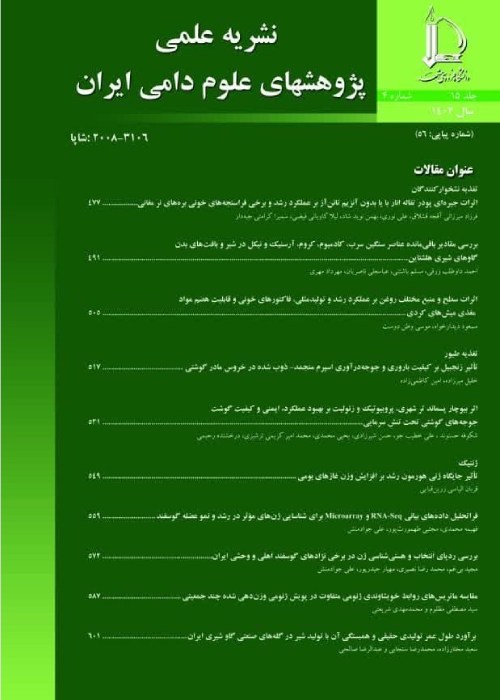Effect of Selenium with Vitamin E on Production Performance, Immune Response and Blood Metabolites of Laying Japanese Quail
Selenium is an essential trace element, which plays a key role in the development of reproductive performance and animal safety. This mineral is an important part of at least 25 effective proteins in a variety of physiological functions, including increased resistance to oxidative stress, DNA repair, and improvement to reproductive performance and immune function. Despite the fact that selenium requirement of birds can be met by corn-soybean meal diet, dietary sodium selenite up to a maximum level of 0.5 mg kg-1 is highly recommended to improve avian health and productive performance. However, interaction with other minerals, poor retention and lower deposition efficiency questioning the incorporation of sodium selenite into the diet. Vitamin E is the main antioxidant in egg yolk lipid terminating the lipid peroxidation chain by reacting with lipid peroxides and making them be stable. Diet supplementation with vitamin E could improve performance and egg quality and provided health benefits to laying hens. The positive effects of Se and vitamin E on egg production, egg quality traits has been extensively studied in laying hens, but information regarding the potential benefits of these antioxidants on the productive performance of Japanese quails is limited in literature. Thus, this study was conducted to investigate the combined effects of various sources of selenium (0.4 mg kg-1) plus vitamin E (120 mg kg-1) on performance, qualitative characteristics, immune system and blood metabolites of Japanese quails.
A total of 144 12-week-old female Japanese quails were randomly divided into three treatment groups with four replicates and twelve birds in each in a completely randomized design. The experimental treatments consisted of basal diet (with no supplementation) and two organic (sel-plex) and inorganic (sodium selenite) sources of selenium which provided 0.4 mg/kg, plus 120 mg of vitamin E per kilogram of diet. Feed intake, feed conversion ratio (FCR), egg production and quality parameters in fresh and stored eggs, cell immunity, blood cholesterol, triglyceride and total antioxidant contents were evaluated. At the end of experiment, egg yolk selenium and malondialdehyde concentrations were measured. The thiobarbituric acid reactive substances (TBARS) assay with small modification was used to measure lipid oxidation. Briefly, 2 grams of homogenous yolk was mixed with 5 mL of 20 % trichloroacetic acid (TCA) and 4 mL distilled water, and homogenized for 30 s at high speed. The homogenate was then centrifuged (1000 g for 20 min) and the resulting supernatant was filtered with Whatman Filter Paper (grade no. 1). Two mL of filtrated was mixed with 2 mL of thiobarbituric acid (TBA, 0.02 M) in a test tube and heated in boiling water for 20 min. After cooling, the absorbance of the resulting solution was read with a spectrophotometer at 532 nm.
The results showed that egg weight, egg laying percentage and feed conversion rate were not affected by selenium organic and inorganic sources compared to control group (P > 0.05). Birds receiving organic selenium along with vitamin E in their diets had low feed intake compared to other treatments and their feed conversion ratio numerically decreased and intended to significant (p<0.1).The organic selenium plus vitamin E improved the height of white, HU units, yolk pH, and yolk index compared to control group. Egg quality parameters including yolk index and shell surf index in inorganic selenium group were significantly higher than control group (p<0.0.05). Egg yolk selenium was increased in organic and organic selenium (2.06, 1.31 mg/kg) compared to control (0.36), which is a better value from the nutritional viewpoint. Blood cholesterol and triglyceride levels were not affected by experimental diets. Concentration of yolk MDA was highest in control and lowest in organic selenium group during storage (P < 0.05). The result of this study showed that egg production, feed conversion ratio and total egg mass were not affected by experimental treatments. This was also observed by other researchers who evaluated the dietary inclusion of vitamin E. In another one egg quality parameters, however, egg weight was significantly raised after being fed with a diet contained 120 mg kg-1 of vitamin E and 0.4 mg kg-1 of organic selenium.
In conclusion, our study data revealed dietary organic selenium and vitamin E, could improve the egg quality during storage and increased egg yolk selenium of Japanese quails.
- حق عضویت دریافتی صرف حمایت از نشریات عضو و نگهداری، تکمیل و توسعه مگیران میشود.
- پرداخت حق اشتراک و دانلود مقالات اجازه بازنشر آن در سایر رسانههای چاپی و دیجیتال را به کاربر نمیدهد.




